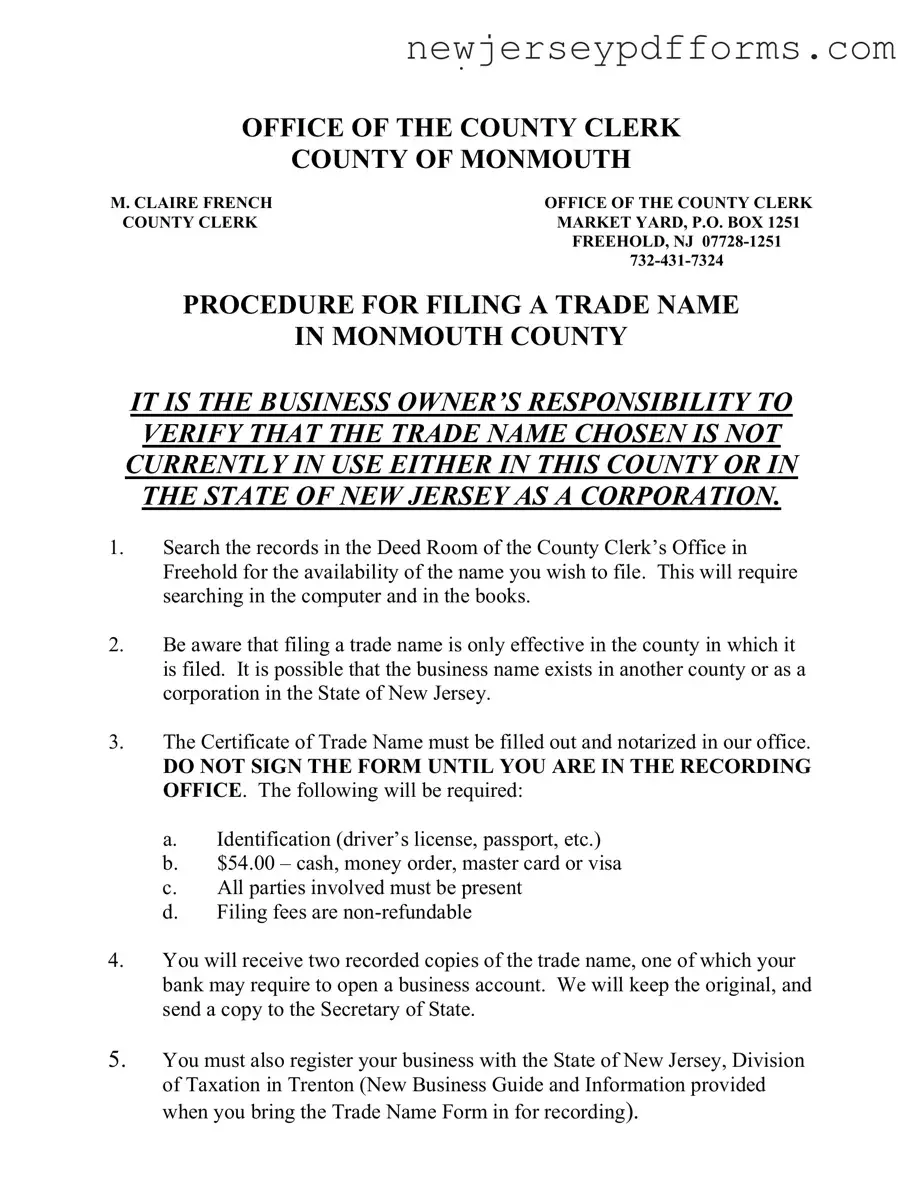The Certificate of Incorporation is a document that establishes a corporation in New Jersey. Similar to the Nj Business Names Monmouth County form, it requires the business owner to provide specific information about the business, such as its name and purpose. Both documents must be filed with the appropriate governmental authority and become part of public records. However, while the Nj Business Names form is used for trade names or "doing business as" (DBA) registrations, the Certificate of Incorporation is necessary for creating a legal corporate entity.
The Assumed Name Certificate serves a similar purpose as the Nj Business Names Monmouth County form, particularly in states that require it. This document allows businesses to operate under a name different from their legal name. Like the trade name registration, it ensures that the chosen name is not already in use. Both documents aim to protect consumers by providing transparency about who is behind a business.
The Business License Application is another document that shares similarities with the Nj Business Names form. While the latter focuses on the trade name, the business license application is required to legally operate a business within a certain jurisdiction. Both documents may require similar information, such as the business name, address, and owners’ details, making them essential for compliance with local laws.
The Fictitious Business Name Statement is commonly used in many states, including New Jersey, to register a business name that is not the legal name of the owner. This document, like the Nj Business Names form, ensures that the name is available and not already in use. Both forms help maintain a public record of business names, which can be important for consumer protection and legal purposes.
The Partnership Agreement is a foundational document for businesses operated by multiple owners. While it does not register a business name, it often includes the trade name under which the partnership will operate. This agreement outlines the roles and responsibilities of each partner, similar to how the Nj Business Names form identifies the owners of a business. Both documents are crucial for establishing clear expectations among business owners.
The Operating Agreement is essential for Limited Liability Companies (LLCs) and serves a similar purpose to the Nj Business Names form by detailing how the business will operate. While the Nj form registers the trade name, the Operating Agreement outlines the management structure and financial arrangements among members. Both documents contribute to the formalization of a business entity and protect the interests of its owners.
The Sales Tax Registration is another critical document for businesses operating in New Jersey. Although it does not focus on the business name, it is required for businesses that sell goods or services. Similar to the Nj Business Names form, it necessitates the disclosure of the business name and owner information. Both documents are part of the regulatory framework that ensures businesses comply with state laws.
The Employer Identification Number (EIN) application is vital for businesses that have employees or operate as corporations or partnerships. Like the Nj Business Names form, it requires the business name and owner details. The EIN serves as a unique identifier for tax purposes, while the Nj form registers the trade name, making both documents essential for legal and financial operations.
Understanding the various legal documents essential for business operations is crucial, much like the significance of utilizing a PDF Document Service for creating specific legal forms. These documents, including the Certificate of Incorporation and Business Registration Certificate, help outline critical information about the business and ensure compliance with state regulations. Each document serves a distinct purpose that contributes to the overall structure and legality of the business, making it imperative for owners to grasp their details thoroughly.
The Trademark Application is a legal document used to protect a business's brand name or logo. While the Nj Business Names form registers a trade name, a trademark provides exclusive rights to use that name in commerce. Both documents are important for establishing a business identity and protecting it from infringement, although they serve different legal functions.
Finally, the Articles of Organization for an LLC is a document that formally establishes a limited liability company. Like the Nj Business Names form, it requires the business name and owner information. Both documents are essential for creating a legal business entity, but the Articles of Organization also outline the structure and management of the LLC, making it a more comprehensive document in terms of governance.

